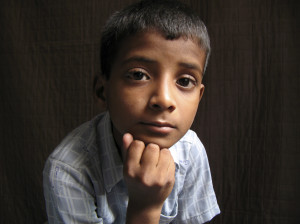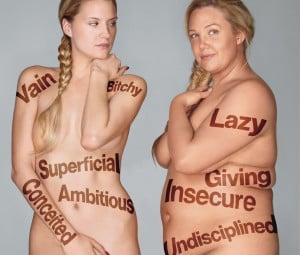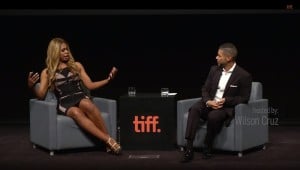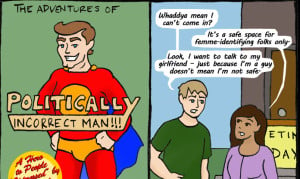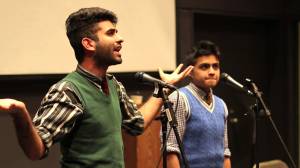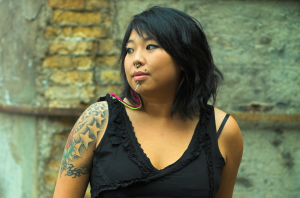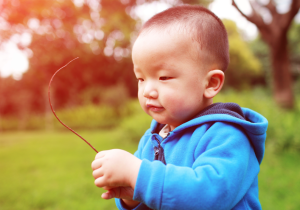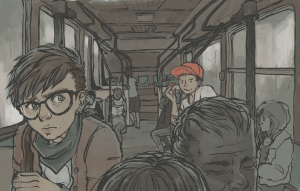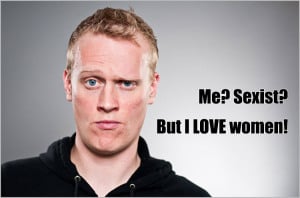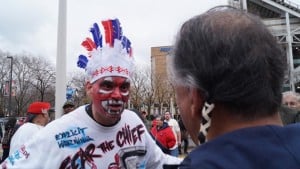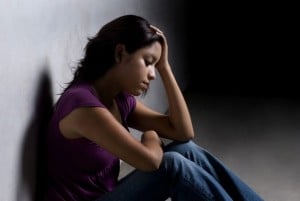This is a shortened version of a more detailed piece by the author. For more, please see the author’s full publication on Medium.
I was an uncomfortably shy twelve-year-old, dealing with a stubborn new mustache, perpetually crooked glasses, and this growing feeling that – because of my religion and the way I looked in my brown skin, in my off-brand basketball shorts, with my wavy black hair, and my meek, cracking voice – I didn’t belong.
It was a summer’s day in Springfield, Illinois, and I was playing basketball with an older white boy who lived down the street, when he suddenly decided to say something about my mom.
The thing is though, on the court, with the ball in my hand, I always felt a little more confident, and a little more like a grown man – which, at that age, meant some combination of Michael Jordan, Tom Cruise, and the prophet Muhammad.
There were even times when I felt so dominant dribbling across the lane that I would forget how uncool my Payless shoes were or that my clothes smelled like ilish maas or whatever Bangladeshi torkari my mom was cooking that day. I’d let my arm linger in the air after a shot, and sometimes smile knowingly as the ball sailed over the other guy’s outstretched hand. Swish.
In those brief moments, I was the hero: strong, on top of the world.
This kid from my block, though, he was better than me. Not only was he a year older, but he was bigger, had post moves, and was more adept at trash talk. You’re weak. You shoot like a girl. And though I was used to this, today my game was off – and his insults were piercing.
“Why does your mom wear that thing on her head?” he asked with a smirk I can still picture nearly twenty years later. “I heard it’s because she has warts all over her face.”
I paused about fifteen feet from the basket, feeling the synthetic leather of the ball in my hands, staring at his sideways mouth, thinking about my mom in her hijab. Thinking about the game I was losing. About how much I hated being on the outside of everything.
It was a silly, incoherent insult in retrospect, but as the rush of all my anxieties converged, I suddenly felt exposed.
So I threw the ball directly at his face – knocking him to the ground.
He looked up and laughed. But for an instant, standing above him like that, I felt something like strength. I gave him the finger (probably the wrong one) and got on my bike to ride away, only to realize halfway down the block that we were playing in my driveway. I kept going anyway – overcome with anger, tears, and embarrassment.
That was the entire extent of my first “fight,” but over time, it became something larger in my mind. Though white supremacists burnt down our city’s mosque two years earlier, and I had found a local KKK newsletter on our doorstep once after that, it wasn’t until I felt the sting of that boy’s words that I truly began to understand exactly how different I was in this country.
But I never got in another fight. In seventh grade, when bullies held me upside down on the playground, called me “Apu,” and stole my lunch money (really), I didn’t hit anyone. On the bus back from a basketball game freshman year, when they thought it was funny to pull their pants down and sit on my face as I slept, I just woke up and pretended to laugh with them (and took two showers when I got home).
There instead developed this overwhelming feeling of otherness, one that wouldn’t coalesce until a few years later, when, on September 11th, teachers asked me to stand at the front of their classes and “explain what was going on.” And a few days after that, when some peers whispered “Osama” as I walked down the hallway.
But in that period after Al-Qaeda’s attack, as paranoia spread in the U.S., I still kept my own frustrations mostly inside, just below the surface when I was pulled over for looking “strangely” at a white cop, or when passing strangers would call me a “sand n — r.”
Despite my increasing awareness of the world’s imbalance, I was never quite angry enough to hurt another person. And I was lucky enough that I was never in a situation where my life was in immediate physical danger or where I felt I had to fight back to survive.
Because the truth is, it was something more than my religion or racism that led me to knock down a boy on that summer’s day.
It’s true I looked up to Muhammad as a kid and even dreamt of becoming him, even if I knew that was impossible. And it’s also true that part of his appeal was the fact that he defeated his enemies in battle.
But the idea that I could feel powerful through aggression, that inflicting pain on someone – fighting – would prove my manhood and keep me safe above others, wasn’t a lesson learned from any single source. It was ubiquitous in the world I grew up in.
It was at the movies, where “action heroes” like Cruise were “good” white men who solved their problems through violence. It was on the news, where I learned we desire dominance in our “commander in chief,” more often than thoughtfulness. It was in how men were glorified in my local Bangladeshi community, where at dinner parties, they ate first and led prayer, as women prepared the meals and stood in the back. And yes, it was in my understanding of religion, where I learned at Sunday school that all the prophets – all the greatest of human beings – were men.
But it was also reflected in what I was reading at public school, where history was framed as this long, bloody battle between men – which was, of course, always won by the stronger, rich, white ones.
I couldn’t win that game, but I wanted to play it anyway. I could never change my skin color – but I could still be a man within my own communities. On the basketball court. At the mosque. In my family. A little hit of power was always within reach.
I’m not a Muslim anymore – I stopped believing over a decade ago – but I’ve thought a lot about that childhood “fight,” and the frustration I felt afterwards recently. As an angry young man walked into a church in Charleston to kill nine Black people last year, and as another one was sentenced to death for setting off a bomb in Boston, I recognized parts of my own story in theirs.
Not because of Islam, or because I sympathize with their horrific choices, but because I also grew up as a boy in this country.
Contrary to how we often talk about these incidents, and as uncomfortable as it may be to admit, I don’t think terrorism is a product of some supernatural “evil” or the result of an unknowable “mental illness.”
Surely many social issues work together to produce the environments in which this dangerous thinking flourishes, but it seems to me that there is also a too-often unspoken link between men resorting to violence and the same hypermasculine culture that’s made shooting virtual human beings one of America’s favorite pastimes, alongside the harassment of women, and the celebration of misogyny in sports. It’s a culture which all of us, to varying degrees, participate in.
But it’s easier to avoid this truth – to grab at branches instead of digging out the roots.
It’s how I dealt with my own frustrations when I went to college in 2002. I didn’t just feel anger towards the white politicians and pundits on TV calling me names, but also the Muslim men around me who I felt weren’t good enough to prove them wrong. They drank alcohol. They talked about girls. They smoked too much hookah. They ate pepperoni pizza one time on accident.
If I couldn’t be a part of white male culture, then I wanted to be the best Muslim possible – to both rebuke the criticisms coming from white America and to show everyone that I truly mattered. The more religious I could become, I decided, the more I could prove to both my community and George W. Bush that I was a “real man.”
Though I never lashed out again, I carried with me, for a long time, that feeling of exclusion, resentment, and belief that my self-worth was tied to my ability to control my surroundings.
Of course, it’s not possible to be that in control. And I was just as hypocritical as those I secretly condemned. I went to parties where I stood sober, simultaneously feeling like I was better than all the white people in the room and all the Muslims who weren’t cool enough to be invited. In my convoluted thinking, I was above both the “immoral” people who had sex before marriage, and the “backward” ones who thought being gay was a sin. I casually oogled women, while judging others for smoking weed.
It was an illogical mess, but all that mattered was that I felt superior – in some way, to someone. And actually, most often, those “someones” were women.
The vast majority of us – Muslim, Christian or otherwise – will never do anything as awful as act of terror, but most men will use their power in society to casually degrade women in order to make themselves feel better.
We will whistle at women on the street or like some gross meme on Facebook. Most straight men will at some point tease another man by comparing him to a woman, calling him a “pussy,” a “bitch,” or “gay” in order to mock some expression they read as feminine.
We may not become Bill Cosby or Terry Richardson, people with long histories of sexual abuse, but many will still learn to use the threat of violence to hurt the women and girls around them – most often Black and indigenous women – and will casually maintain environments at work, at home, at places of worship, or within their friend circles, that are unwelcoming to anyone who doesn’t identify as a straight man, or who doesn’t worship toxic masculinity.
Meanwhile, most young boys in this country, seeing these behaviors reflected around them, will grow up thinking that degrading girls is a part of becoming a “real man” – like I once did.
Which is also why that bully targeted my mom to get to me. She was a tool in his attempt to lift himself up. You shoot like a girl. And as a brown teen, I not only already understood his insult as a challenge to my manhood, but also as a reminder that I was inherently inferior to him, weaker – and thus, more “feminine” – because of my skin color, ethnicity, and religion.
I reached for violence in that lonely moment because I felt it was the only way I could be strong again. Worth something. I acted not from a place of empathy for my mom, but more out of a need to impose myself in an environment that felt increasingly out of my control.
It took me many more years to realize, though, that I was struggling for acceptance into a club which you can never quite get into. Because no amount of power or bullying or sex could ever make me man enough.
***
In July of last year, I read a New York Times op-ed exploring the motivations for mass shootings, where the author concluded that “what makes someone seek solace in a spasm of bloodshed is perhaps unknowable.”
The piece, which is filled exclusively with examples of mass shootings by men (nearly all of whom are white), makes no direct reference to either race or gender, while it investigates mental illness, gun laws, and other possible causes of terrorism.
Solace in a spasm of bloodshed. I’m not sure that’s right either. Or at least it seems to me to be less about the blood, and more about the spasm. The expression of anger itself. The loss of control, as a way to demand control.
Wasn’t George Zimmerman also looking for some comfort, some fulfillment of his worldview, when he erupted to kill Trayvon Martin? Don’t suicide bombers, or those who make videos of beheadings, seek the soothing acknowledgment of their eternal “manliness” as well?
And each time I was a bully myself – reducing a woman to a thing, or laughing along with some racist joke – didn’t I want to be reassured that I mattered somehow, too?
Human actions are always tangled within the many social systems we live in. And without the broad view, we stagnate. We stay put in the same culture of frightening machismo that manifested on September 11th, in the colonialist wars that followed, and which persists today, in schools like the one where a police officer shamed a Black Muslim teenager for building a clock – or at Trump’s raucous speaking engagements.
I left Islam because I stopped believing in god, but also because I felt isolated by the idealization of men that I saw in my religious community. Yet, the truth is, I’ve never been able to escape that worship of toxic masculinity. Because it’s everywhere, and it still lingers in me.
Because it should matter that nearly all mass shooters in this country are men, and that they are largely straight cisgender white men. It should matter that there are many violent men in predominantly Muslim countries, but that they fight within a global economy ruled by white men.
Because, what is too often left unsaid on cable networks or in mainstream political debates, is that terrorism – like police brutality or rape culture – is never the result of any single structure of oppression. And that women worldwide, especially poor, trans, and disabled women of color, are always suffering the most as a result.
When I peer into the broken lives of the American men who terrorize us, or the uniformed men who keep murdering Black people out of fear, or the men of ISIS who rape women in order to enforce their “moral” code – or those macho men who indiscriminately hate Muslims – I see the same messages around power, race, and gender converging as they once did in me, amplifying that ever-present desire in men for physical dominance.
I will always have to face the roots and remnants of this in myself. As will anyone who was raised to be a man, or to believe that there is a single definition of manhood. President Obama is no exception. Neither are the Pope and his Catholic boys club. Any man who claims that they’re not struggling, on some level, is struggling – hurting – at that very moment.
Because the very nature of the struggle is this need to prove that masculinity exists at all. That it is something more than the absence of femininity. That it is something more than the urge to push down.
Yet rather than continuing to spend our energy acting out of this insecurity, we might direct ourselves towards building a society which views women of color like my mom with as much empathy as me. And one that discourages, rather than encourages, the actions of white men who bully.
[do_widget id=’text-101′]
Imran Siddiquee is a writer and filmmaker interested in race, gender, and media representation. Follow him on Twitter @imransiddiquee. This is a shortened version of a more detailed piece by the author. For more, please see the author’s full publication on Medium.
Search our 3000+ articles!
Read our articles about:
Our online racial justice training
Used by hundreds of universities, non-profits, and businesses.
Click to learn more


